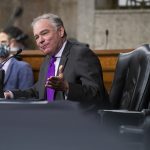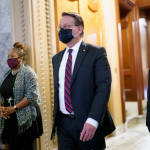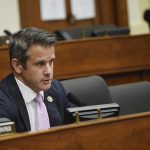At least six GOP senators plan to violate their conference’s toothless earmark ban and more than a dozen others won’t commit either way, citing fears that they’re relinquishing power to Democrats if they don’t participate, according to a POLITICO survey of all 50 upper-chamber Republicans.
Less than 30 Senate Republicans have definitively sworn off earmarks as Democrats revive the practice of congressionally directed spending this year. Ten said they were still chewing on the issue, while several didn’t comment or refused to say whether they will honor the earmark prohibition that remains in place — although technically unenforceable — for the entire Senate GOP.
The fact that half a dozen Republicans are willing to openly flout the ban suggests that Washington is returning to its traditional horse-trading ways after President Donald Trump’s free-spending dismissal of the nation’s $3 trillion deficit wiped away much of the tea party’s influence on the GOP. Earmark abstainers, including a number of 2024 hopefuls, can claim the moral high ground by bucking a practice that’s landed lawmakers in prison and that conservatives call a “gateway drug” to wasteful spending. But the GOP’s most vocal earmark critics aren’t quite leading the day, particularly after House Republicans ended their own ban.
The six Republicans who said they expect to request earmarks run the gamut electorally. Two of them are retiring next year, one’s in store for a tough 2022 election and three just won reelection in 2020. For them, and those who have not committed either way, there is one main dilemma adding to the desire to disobey the ban: fear of ceding the budget field to Democrats, who could divert millions of dollars in federal funding to local projects in their own states, while Republican-led states get left out.
“If House Republicans are requesting individual projects and House Democrats are — and Senate Democrats are — it would seem to me there’s a big gap there for the people we represent if we don’t become part of that process,” said Sen. Roy Blunt (R-Mo.), the top Republican on the spending committee that funds the Departments of Education, Labor, and Health and Human Services.
Republican support for reviving earmarks is largely concentrated among GOP appropriators, tasked with writing annual spending bills. Sens. Richard Shelby (R-Ala.), Susan Collins (R-Maine), Shelley Moore Capito (R-W.Va.), Lindsey Graham (R-S.C.), Lisa Murkowski (R-Alaska) and Blunt have all said they expect to participate.
Democrats have already announced details of the new process to steer funding to specific projects in multiple states, from hospitals to colleges to dam repairs.
“Democrats in leadership have already made clear they’re going to run through with it,” said Sen. Thom Tillis (R-N.C.). “So the debate really is: Would you just provide that tool to the Democrats for directed appropriations?”
Senate Minority Leader Mitch McConnell, himself a consummate appropriator, remains silent on the issue despite repeated questioning. It was the Kentucky Republican who acquiesced to tea party demands nearly 11 years ago in leading GOP senators in adopting the ban, in conflict with his longtime advocacy for Congress’ power to control spending.
At that time, in 2010, former Rep. Duke Cunningham (R-Calif.) had been in prison for more than four years after his conviction on corruption charges, including for taking $2.4 million worth of bribes for earmarks.
Now, Democrats are promising a more virtuous brand of earmarks designed to keep bad actors like Cunningham from exploiting the process, and many Republicans are intrigued by the revamp.
“The traditional earmarks system — no, I don’t support that. So I’m just looking to see what comes out of this,” said Sen. Mike Crapo (R-Idaho), who is undecided on whether to partake.
After House Republicans voted in a secret ballot last month to allow earmarks, Senate Republicans decided not to repeal or reinforce their ban when GOP lawmakers met last month to adopt their rules. About one-third of the chamber’s Republicans were "drifting" toward supporting the process again, before opponents made the hard sell for fiscal responsibility, Sen. Ben Sasse (R-Neb.) said.
Twenty Republican senators also signed a pact this month to oppose earmarks, decrying participation in “an inherently wasteful spending practice that is prone to serious abuse.” Several others who did not sign that commitment say they, too, are staunchly against the practice.
“I’m gonna do everything I can to blow up the process so that no one does earmarks,” said Sen. Roger Marshall (R-Kansas), who did not sign the letter of opposition. “I’m serious. That’s my plan going forward.”
In both the House and Senate, the new rules Democrats have outlined require all earmark requests to be posted online. Lawmakers and their immediate families are not allowed to have a financial stake in the requests, and funds can’t go to for-profit recipients.
For newcomers who have never requested earmarks before, confusion about how to partake adds to the political quandary.
“The process is so opaque. And it’s just unclear to me. So I don’t know how I would,” said Sen. Todd Young (R-Ind.), who came to Congress in 2011, right after the earmark ban was adopted. “I don’t anticipate it being really clarified much in the future, but we’ll see. I’ll give them a chance.”
Even some longtime lawmakers who have experience with the process didn’t give clear answers.
Sen. Chuck Grassley (R-Iowa), who has served in Congress for more than 46 years, said he wants to listen to his constituents first but is “not very enthused about” requesting earmarks.
“I think for now it would be better if I say no, I’m not going to take any,” he added. “Just to be honest with you, it’s brand new. I haven’t dealt with it for 11 years.”
Under the new earmark restrictions in both chambers, the amount of money that can be spent through the process is limited to 1 percent of discretionary funding, or about $14 billion. To some, in the scheme of the more than $1.3 trillion appropriations budget, the sliver devoted to earmarks seems unnecessary since local funding needs can be addressed through the regular spending process.
“I don’t plan to request earmarks. You know, we’ve gotten pretty good at appropriating to priorities,” said Sen. Kevin Cramer (R-N.D.), a freshman senator. “For one thing, there’s not even enough money where we’re even talking about fulfilling everyone’s desires.”
There are two other factors diminishing the allure of earmarks this year.
Because Congress has cleared several multitrillion-dollar relief packages since the pandemic began — like the $1.9 trillion stimulus President Joe Biden signed in March — the spoils of the regular appropriations process seem small-fry compared with the funding senators can score for their states under the kind of economic aid packages enacted over the last year.
Biden has also yet to submit his full budget request, and Democrats are preoccupied with passing an infrastructure package. So Congress could be headed toward another stopgap spending bill come September, dragging out current funding and completely negating earmark debate in the meantime. Until Congress begins real work to fund the government, there is little incentive for Republicans to embrace or decry earmarks.
“I don’t know,” Sen. Richard Burr (R-N.C.) said about whether he plans to request earmarks. “Are we going to have an appropriations bill? You’re asking me to do a hypothetical. I’m not going to do that.”
Especially among appropriators, there is a belief that specifying exactly where federal money should flow is not only lawmakers’ prerogative but also their duty.
Shelby, the Senate’s top Republican appropriator, noted that the renewed power to earmark will also help lawmakers from both parties ensure federal funding ends up where intended, rather than surrendering that control to Biden administration officials to mete out as they see fit.
“I think we ought to consider everything on the merits and go from there,” Shelby said. “Are you going to let Biden and his administration do it all?”
Daniel Payne contributed to this report.





















